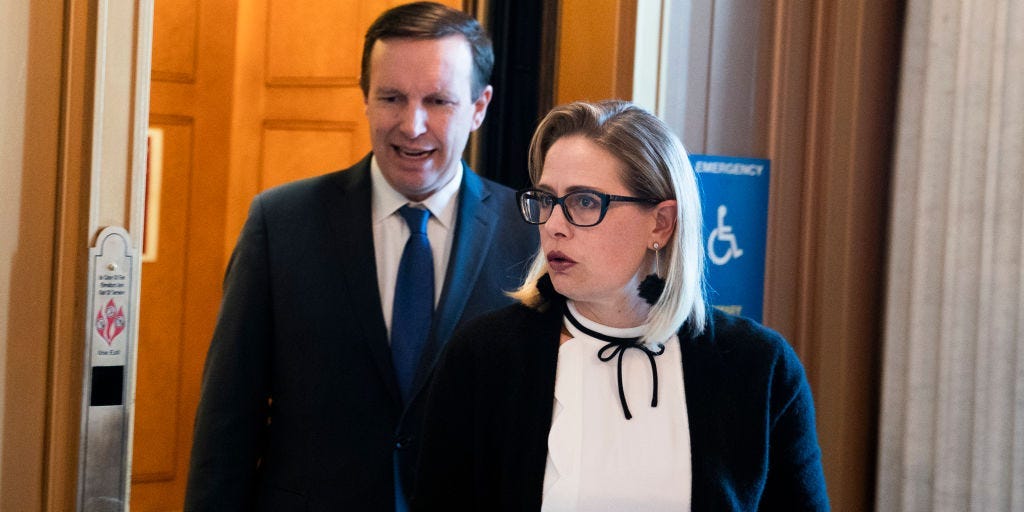- Republicans and Democrats are feuding over taxes, again.
- Part of the debate is geared to an audience of one: Sen. Kyrsten Sinema.
- She holds the make-or-break vote on Biden's big bill and hasn't commented publicly.
After Sen. Joe Manchin's surprise announcement of a deal bringing back Democrats' economic agenda from the dead, Congress is locked in a feud over who will bear the brunt of the tax increases that would pay for the proposed spending and deficit reduction.
Much of the sparring is meant to sway an audience of one: Sen. Kyrsten Sinema of Arizona, who holds the make-or-break vote on Democrats' climate, energy and tax package.
Sinema hasn't publicly weighed in on the legislation that Manchin negotiated with Senate Majority Leader Chuck Schumer yet. In April, she said she wouldn't back "any tax policies that would put a brake on any type of economic growth or forestall business and personal growth for America's industries."
Both parties are doing their utmost to woo the Arizona centrist to their point of view. Republicans are pummeling Democrats using an estimate from the nonpartisan Joint Committee on Taxation completed at their request. It indicates a proposed 15% minimum tax on large, profitable firms will amount to a tax increase on most Americans, regardless of their income. Only 150 large companies will be affected under the Democratic proposal.
Whether corporations or people bear the burden of those big business tax hikes is at the center of the debate. The GOP case against the bill relies on a view that companies will pass on tax increases to families in the form of lower wages or hits to stockholders investments. They also argue much of the burden will fall onto domestic manufacturers.
The JCT analysis, though, doesn't provide the full picture, Democrats say. It excluded many other financial benefits for taxpayers ranging from increased Obamacare subsidies and lower prescription drug costs from future Medicare negotiations they argue end up providing a big boost to plenty of American households.
"People implying that the tax will show up on tax forms for middle-class families are clearly wrong. It won't," Jason Furman, a former top economist to President Obama, wrote on Twitter. "In fact it will help."
Democrats are punching back. They say the bill doesn't run afoul of President Joe Biden's pledge to spare Americans earning less than $400,000 from new taxes. Democratic lawmakers have an ally many never expected in their corner of the ring: Sen. Joe Manchin of West Virginia.
After resisting advancing a smaller package earlier this spring, Manchin is the main salesperson for the current push. The conservative Democrat is hitting TV and radio interviews advocating for the legislation, and spending some time trying to influence Sinema.
"This is everything Kyrsten agreed to in December," Manchin told West Virginia radio host Hoppy Kercheval on Tuesday. "She's the one that kept saying we want no new taxes, no new taxes. Okay, so I agree with her — no new taxes."
"We basically just close the loopholes because they are taking their discounts all the way to zero," he said, referring to large companies paying nothing in federal income tax.
It appears possible, if not likely, that Democrats will put the bill on the Senate floor later this week without knowing which way Sinema's leaning. Both parties will get their response to the tax fight then.

